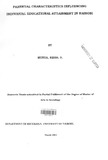| dc.description.abstract | In recent times education has been given a priority role in its ability to offer or with hold the chance
of one rising in the socio-economic hierarchy. This can be seen by the efforts the Government of
Kenya makes in trying to make education available for all Kenyans.
As at independence in 1%3, the government of the day endeavored to have Africans running all
the major operations of the country and thus the maior emphasis in education However in recent
times there has been a steady decline in the standards of education, particularly access to secondary
school education Moreover, evidence indicates a significant relationship between family structure
during childhood and their outcomes later in life. However this relationship may vary from society
to society. The purpose of the study was to assess the parental characteristics in influencing the risk
of one reaching secondary school in Nairobi.
A history of formal education in Kenya was reviewed that was used as a back drop of recent
events in the education sector. Various scholars works were also analysed with several asserting
that indeed there was an empirical association between children's educational attainment and family
background. However these studies were conducted in rural areas thus prompting the researcher
to undertake a similar study in an urban area The study employed three theoretical perspectives
that is; Socialisation theory, Modernisation theory and the Achievement Motive theory.
The study was based on biographical data obtained from Nairobi Urban Integration Project. A
~
sample of 1065 males and females from across three generations were analysed These were all
resident in Nairobi at the time of the survey. Survival Analysis or Event History analysis where the main interest is measuring time until an event occurs (reaching secondary school) was employed for
this study. Using Cox Proportional Hazards model, we estimated the effect of parents'
characteristics such as religion,parental education in the chance of one entering secondary school.
The study established that there were no differentials in the risk of entering secondary school
for different ethnic groups, different migration status, sex and religion. However the findings
revealed that the educational level of parents was found to significantly increase the chance of
one reaching secondary school. Moreover, the generations showed differentials in the
likelihood of one entering secondary school.
Given the findings of this study it is clear that the cost of education should be subsidized so as
to cater for the needs of the poor. This is because in view of Structural Adjustment Policies it
is increasingly difficult for parents to shoulder the burden of educating their children. Given
the limitation of the data, more conclusive evidence must await a more appropriately designed
study on the factors that may influence the risk of reaching secondary school. | en |

